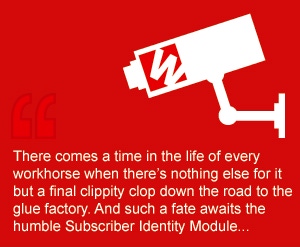There comes a time in the life of every workhorse when there’s nothing else for it but one last bag of oats and a final clippity clop down the road to the glue factory. Younger, stronger replacements may have arrived, or technology rendered it outdated, and there’s no room for sentimentality in these things. This week we got an inkling that such a fate awaits the humble Subscriber Identity Module.
November 19, 2010

By The Informer
There comes a time in the life of every workhorse when there’s nothing else for it but one last bag of oats and a final clippity clop down the road to the glue factory. Younger, stronger replacements may have arrived, or technology rendered it outdated, and there’s no room for sentimentality in these things. This week we got an inkling that such a fate awaits the humble Subscriber Identity Module.
The GSMA announced the creation of a Task Force that will develop an embedded SIM that can be remotely activated. It all sounds vaguely sinister; certainly if you’re a traditional SIM card—or a company that makes them. It was GSMA overlord Rob Conway who sounded the death-knell for the SIM as we know it, in that time-honoured fashion of commending it for its contribution to progress.
“The traditional SIM has been an important innovation in mobile telephony, and has provided many benefits to consumers in terms of security, portability of contacts, and ease of portability of devices across networks,” Conway said, as loyal, hard-working SIM cards the world over began to feel a little uneasy. “As our industry moves from connecting phones to connecting a wide range of devices, it is apparent that the embedded SIM could deliver even greater flexibility. The embedded SIM will provide assured levels of security and portability for consumers, as well as provide additional functionality for enabling new services such as e-Wallet and NFC applications,” Conway added.
The task force comprises brainiacs from leading operators, including including AT&T, China Mobile, Deutsche Telekom, France Telecom Orange, KT, NTT DoCoMo, SK Telecom, Telecom Italia, Telefonica, Verizon Wireless and Vodafone. Its stated aim is to deliver a technical solution as an evolution of the current SIM provisioning mechanisms, which will include programmable SIM card capabilities to enable remote activation. A complete analysis of market requirements is scheduled to be complete by January 2011, the GSMA said, with devices featuring the new SIM activation capability expected to appear in 2012.
As you can imagine, readers, the manufacturers of SIM cards are none-too pleased. Through their own industry mouthpiece, the SIM Alliance, they made forceful expressions of concern, urging us all to remember the benefits of the removable SIM. The first three words of the statement, for the Informer at least, only added to the sense of foreboding.
“These last days,” said the Alliance’s statement, which the Informer couldn’t help but hear in the voice of Winston Churchill, “we have seen in the Press numerous articles mentioning a new way to distribute smart phones that would be activated on selected Mobile Network Operators using a remote download to an embedded (U)SIM.” If this had been a statement delivered to some huddled masses, there would have been a collective intake of breath at this point. But it wasn’t.
“As this would change dramatically the business model,” the Alliance said “[we] would like to remind end-users and the ecosystem they Key Benefits of a User Removable (U)SIM Card in Personal Mobile Communications.” They capitalised the whole of that last bit to underline just how serious this is.
And, indeed, there are obvious benefits. Security, freedom of movement between handsets and operators, portability of data; all were held up by the Alliance as positives that ought to guarantee the future of the SIM card with which we are all familiar. “In order to maintain the aforementioned key benefits, the SIM Alliance considers that (U)SIM Card removability and accessibility by the end user is mandatory for personal mobile communications usage,” the group thundered in crescendo.
Stirring stuff. But the Informer can’t help but feel that the SIM Alliance is either with the GSMA, or against it. It’s probably a case of evolve or die.
The SIM card death squad wasn’t the only task force announced this week, with US operators banding together to enable point of sale purchases to be made using mobile phones. AT&T, Verizon Wireless and T-Mobile have set aside their competitive differences for the sake of the wider market, using near field communication technology to bring alternative payment methods to market under the banner of Project Isis. Barclaycard US is believed likely to be the first issuer on the network, although it will be open to all merchants, banks and mobile carriers, the group said.
While we’re on the subject of competitor collaborations, it was announced by Ericsson after last week’s AWIW was sent out into the ether, that the integration project that has seen the 3G networks of T-Mobile UK and 3UK merged into one has now been completed. More than 12,000 sites have been consolidated, and more than 5,000 switched off as part of the project, Ericsson said.
On Monday the Informer journeyed out through the wealthy outer-London suburbs to the headquarters of MBNL, the joint venture created by 3 and T-Mo to oversee their shared network, to meet Graham Payne, the man in charge of the entire project. Keep your eyes peeled for the interview footage, which will be appearing on Telecoms.com very soon indeed.
And the kind of 3G performance the joint network enables is more than good enough for the time being, according to UK regulator Ofcom. Speaking at this week’s FT World Telecoms conference in London, Ofcom CEO Ed Richards said that 4G spectrum awards will not take place until Q4 2011, with licences in the 800MHz and 2600MHz bands being issued in Q2 2012.
But this isn’t quick enough for everyone on the UK scene. CEO of Telefónica Europe, Matthew Key, who was also speaking at the event, said the process is taking “simply too long”. Key expressed concerns that the UK is lagging other European markets by two or three years in the allocation of 4G spectrum. The UK can’t top the table in every area, though, and we should be content with the spheres in which we do show leadership. We’ve got the continent’s highest teenage pregnancy rate, for example.
While we’re on the topic of LTE spectrum, the GSMA, which has had a busy week, has published research suggesting that mobile services could increase the GDP of Asia Pacific nations by $729bn in the next twenty years. The research is part of the GSMA’s bid to persuade governments that the 700MHz spectrum released as the region’s broadcasters switch to digital transmission should be allocated to the mobile industry.
The research, from a report compiled by the Boston Consulting Group, suggests that reserving the 700MHz spectrum for mobile broadband deployment could create more than two million jobs in the region and increase tax revenues by $131bn, as well as generating the regional GDP increase.
The benefits would only be realised, the GSMA said, if all national governments agreed to allocate the spectrum to the mobile industry, and if they all adopted the Asia Pacific Telecommunity’s 2 x 45MHz band plan for the 700Mhz band, creating harmonisation and economies of scale.
The report was based on in-depth studies of Korea, India, Indonesia and Malaysia in a bit to represent the wide range of Asia Pacific markets. It concluded that there would be “a large incremental adoption of internet connectivity, particularly in rural areas, as a result of allocating the 700 MHz band for LTE, including a 14 per cent increase in internet subscriptions in Korea, 21 per cent in India, 22 per cent in Indonesia and 23 per cent in Malaysia.”
Sticking with LTE, Huawei announced this week that it has got the contract to supply what it claims will be the world’s first commercial TDD LTE network, which it will be doing for Polish carrier Aero2. The Chinese vendor said that the network is scheduled for switch-on early next year.
In Sweden, meanwhile, where commercial LTE made its debut, Tele2 has joined the party. The carrier has launched a network in Stockholm, Gothenburg, Malmo and Kariskrona. The firm’s aim is to cover 99 per cent of the Swedish population with 4G by the end of 2012.
Now onto matters green, and the news that Nokia and Telefónica have joined forces to launch what they claim is the most environmentally friendly handset offer on the commercial market. To be seen first in Spain, Telefónica plans to roll the offering out into other of its markets, including the UK, Germany, Argentina, Peru and Chile.
The offering centres on two adapted handsets from Nokia, the N8s and the C7s, which offer a number of eco-tweaks. Energy saving modes, a power efficient AMOLED screen and an ambient light sensor are among these, along with a reminder to unplug the charger once the phone’s juiced up. There’s a bunch of pre-loaded green content, including a game called Climate Mission (watch out Medal of Honor) and Telefónica is planning “green corners” in some of its retail outlets to help promote its ecological messaging.
Another energy saving speciality of the N8 was highlighted this week when it emerged that some models aren’t able to be charged or switched on, and have taken to powering down all by themselves. Now that really is dedication to the cause, isn’t it. A phone so eco-friendly that it consumes absolutely no power whatsoever because it can’t be used. Nokia conceded that a small batch of N8 handsets had exhibited the problem.
The firm said that the N8s and the C7s were among the most sustainable handsets on the market. Let’s hope they’re more sustainable than Nokia’s current smartphone strategy.
In a PR balancing act, Nokia announced this week that downloads from its Ovi application store have hit three million a day. The firm said that more than 400,000 developers have joined Forum Nokia in the past year and more than 92 million apps have been downloaded.
Take care
The Informer
Read more about:
DiscussionYou May Also Like





.png?width=300&auto=webp&quality=80&disable=upscale)

.png?width=300&auto=webp&quality=80&disable=upscale)
_1.jpg?width=300&auto=webp&quality=80&disable=upscale)



.png?width=800&auto=webp&quality=80&disable=upscale)